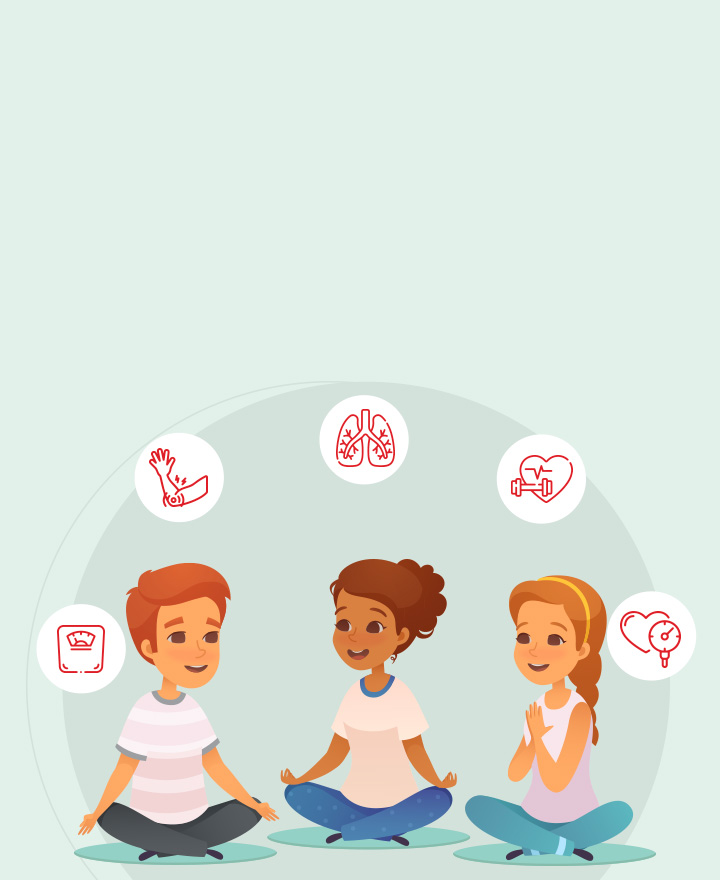

Dental Hygiene: How to Care for Your Child’s Teeth
It is important to keep your child’s teeth clean and healthy. Following some simple tips can help you take care of your child’s teeth and maintain their oral hygiene. Read on to know more.
Make Dental Hygiene Fun
Children can be fussy and unwilling to brush their teeth which can result in poor oral hygiene. Try these handy dental hygiene tips to make it more enjoyable for them.
• Let children choose their own toothbrush, one that has their favourite colour or character.
• Let children choose toothpaste with their favourite flavour.
• Read books or watch videos that talk about dental hygiene.
• Use a timer to make sure kids brush their teeth for 2 minutes or play their favourite song to help keep track of time.
• Reward children for good oral care. Avoid sugary treats.
• A visit to a paediatrician can be overwhelming for most kids. To calm them, plan a fun activity following the dental visit.
Tips to improve your Child’s Dental Health
Apart from monitoring the brushing schedules and techniques, you also need to focus on the following:
1. Choose a fluoride toothpaste:
Fluoride is important to your child’s dental health. It is known to reduce cavities in baby (primary) teeth and adult (permanent) teeth. It also helps make teeth strong by hardening the tooth enamel.
Most children get fluoride in drinking water, however, if your water does not contain fluoride, choose a toothpaste with fluoride content.
2. Brushing and Flossing:
Dental hygiene should begin when your child is a baby. Teach your child to spread the toothpaste among their teeth, gums, and tongue. Have your doctor or dentist show you the right way to brush your child’s teeth. Your child likely will need help brushing their teeth until they are 7 or 8 years old and they should brush their teeth for 2 minutes.
Flossing is another key part of your child’s oral care routine. Teach your child to floss at least once a day. You can buy floss that comes on a handle to make it easier.
3. Cavities:
This is decaying of tooth which occurs when bacteria (germs) build up in your mouth. Cavities are common in children because their teeth can be harder to brush. People who have cavities can pass the cavity-causing bacteria to unborn babies, infants, and children. Also, few children may be at risk for cavities if they:
• Have white spots or brown areas on their teeth.
• Have ongoing special health care needs.
• Do not go to the dentist often.
• Were born early (premature) or had a low birth weight.
4. Diet:
It is important to make healthy food choices for kids as those who consume a lot of sugary foods and drinks are at high risk for cavities. If your child does have sugar, make sure they brush their teeth afterward.
5. Mouth safety:
If your child plays sports then mouth safety is another important part of dental hygiene. To avoid any injuries, they should wear a mouth guard which is a soft, plastic retainer that covers the teeth and sometimes the lips.
When to visit a Dentist?
It is recommended that children see a dentist around their first birthday. This gives the dentist a chance to look for early problems with your child’s teeth. Visit a pedodontist as they primarily focus on dental needs of children from birth through adolescence.
Conclusion
Healthy teeth are important to your child’s overall health. They help your child eat and talk. Strong oral care helps set good dental habits as your child grows. Poor oral care can lead to infection, disease, or other teeth problems.
One of the important components of our overall wellness is also being financially secured. Healthcare emergencies can happen any time, but a good health insurance can protect you from such uncertain situations. To know more about it, click here
Source: Family Doctor, Kids Health
Disclaimer: This blog provides general information and discussions about health and related subjects. The information and other content provided in this blog, website or in any linked materials are not intended and should not be considered, or used as a substitute for, medical advice, diagnosis or treatment. Kindly contact your Doctor before starting a new medicine or health regime.
Related Articles
8 best practices for healthy teeth and gums
How to ease your child's separation anxiety
5 ways to keep your lungs healthy and whole
Published on January 23, 2023

















 Car Insurance
Car Insurance  Bike/Two Wheeler Insurance
Bike/Two Wheeler Insurance  Health Insurance
Health Insurance  Pet Insurance
Pet Insurance  Travel Insurance
Travel Insurance  Home Insurance
Home Insurance  Cyber Insurance
Cyber Insurance  Third Party Vehicle Ins.
Third Party Vehicle Ins.  Tractor Insurance
Tractor Insurance  Goods Carrying Vehicle Ins.
Goods Carrying Vehicle Ins.  Passenger Carrying Vehicle Ins.
Passenger Carrying Vehicle Ins.  Compulsory Personal Accident Insurance
Compulsory Personal Accident Insurance  Travel Insurance
Travel Insurance  Rural
Rural  Critical illness Insurance
Critical illness Insurance